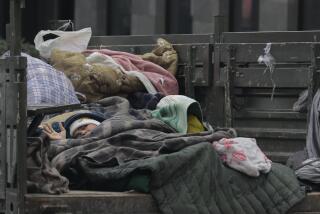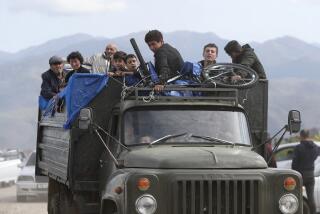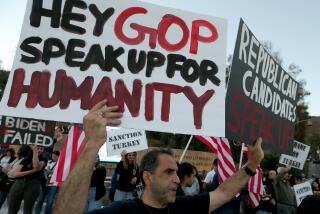Gorbachev Asks for Restraint in Armenia Protest
- Share via
MOSCOW — Soviet leader Mikhail S. Gorbachev intervened Friday in a heated dispute that has brought hundreds of thousands of Armenians into the streets in public protests unprecedented in the Soviet Union.
Gorbachev, risking his prestige as demonstrators massed in the Armenian capital of Yerevan for an eighth consecutive day, appealed for restraint and political maturity in Armenia and in the neighboring Soviet republic of Azerbaijan.
Nevertheless, leaders of the Armenian Communist Party defied the Kremlin’s wishes and called for creation of a government commission to consider popular demands for handing over to Armenia control of Nagorno-Karabakh, an autonomous region in Azerbaijan.
About 90% of the region’s people are Armenian but, as one Soviet source said, “the bosses are not Armenian.”
In Moscow, the Central Committee of the Soviet Communist Party has rejected requests for reconsideration of Nagorno-Karabakh’s status, but Gorbachev appears to be taking a softer line.
The text of Gorbachev’s statement, broadcast by radio and television in both Armenia and Azerbaijan, was not made public immediately in Moscow. But it was monitored by the British Broadcasting Co., which reported that Gorbachev warned of serious consequences that might result from the public protests.
Significantly, however, Gorbachev also held out hope for change, saying:
“We do not wish to evade a sincere discussion of various ideas and proposals. But this must be done calmly, within the framework of the democratic process and legality.”
Remarks Were Read
Gorbachev’s remarks were read in Armenia by Vladimir I. Dolgikh, a member of the Politburo who has been sent to Yerevan on a special trouble-shooting mission.
Georgy P. Razumovsky, who was elevated to membership in the Politburo just last week, read Gorbachev’s speech in Azerbaijan.
A Soviet source in Moscow, informed of the latest developments in Yerevan, said the size of the crowds was “really large--more than 100,000 on a couple of days.” But there were no confrontations, he insisted, no beatings by police and no deaths.
“With crowds of that size,” he said, “you get an uneasy feeling because anything can happen.”
Despite the national party leadership’s endorsement of the status quo in Nagorno-Karabakh, its counterpart in Armenia came out in support of the public demand for a commission to consider a change.
Challenging Kremlin Policy
The party chief in Armenia, Karen S. Demirchyan, addressed a huge crowd in downtown Yerevan from the balcony of the city’s opera house. Demirchyan, attacked by Gorbachev for not doing enough to halt corruption and inefficiency in Armenia, seemed to be taking a popular step in his home republic while challenging the Kremlin policy in a dramatic way.
Foreign correspondents have been barred from traveling to Armenia since the demonstrations began. An American television crew was denied permission to travel even to Tblisi in the neighboring republic of Georgia.
In his address, which was carried over loudspeakers in the streets and parks of Yerevan, Gorbachev asked Armenians to have faith in Lenin’s concept of the “friendly family of all our peoples.” He said the dispute would be resolved “in the spirit of old traditions and according to the principles of Leninist policy on nationalities.”
He said the Central Committee is “disturbed by this turn of events,” which is “fraught with serious consequences.”
‘Revolutionary Renewal’
“It is very important that we do not only consider local conditions but also take into account the processes of revolutionary renewal developing in the country,” he said.
Gorbachev also said that the Central Committee intends to devote “a special plenum . . . to the development of national relations” and that it plans “to discuss a wide range of questions on this most important social sphere.”
Although the protest has been peaceful, the Kremlin leadership is concerned because the events in Armenia might encourage other national groups to take their special causes to the streets as well.
Moreover, although Armenia is one of the smallest of the Soviet republics, its people have family contacts throughout the world and any disturbance there is amplified.
More to Read
Sign up for Essential California
The most important California stories and recommendations in your inbox every morning.
You may occasionally receive promotional content from the Los Angeles Times.










